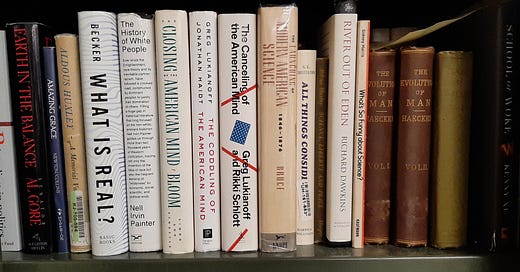Today a young person does not generally go off to the university with the expectation of having an intellectual adventure, of discovering strange new worlds, of finding out what the comprehensive truth about man is. This is partly because he thinks he already knows, partly because he thinks such truth unavailable. And the university does not try to persuade him that he is coming to it for the purpose of being liberally educated, at least in any meaningful sense of the term–to study how to be free, to be able to think for himself. The university has no vision, no view of what a human being must know in order to be considered educated. Its general purpose is lost amid the incoherent variety of special purposes that have accreted within it. Such a general purpose may be vague and undemonstrable, but for just this reason it requires the most study. The meaning of life is unclear, but that is why we must spend our lives clarifying it rather than letting the question go. The university’s function is to remind students of the importance and urgency of the question and give them the means to pursue it. Universities do have other responsibilities, but this should be their highest priority.
Allan Bloom (1982) in Our Listless Universities
The FBI Joint Terrorism Taskforce came to Ithaca to find the person who spewed, in this rural college town where the autumn colors were peaking, what was once thought to be unthinkable and unspeakable.
According to the October 31, 2023 press release from the U.S. Attorney's Office, Northern District of New York, there were threatening messages to the Cornell section of an online discussion site, including a post calling for the deaths of Jewish people and a post that said “gonna shoot up 104 west.” Another post threatened to “stab” and “slit the throat” of any Jewish males, to rape and throw off a cliff any Jewish females, and to behead any Jewish babies.
Now that’s inclusive, and the term antisemitic does not do this spewage justice.
In that same post, there was also a threat to “bring an assault rifle to campus and shoot all you pig jews.”
A few years ago such messages would have been unimaginable hate speech unprotected by the First Amendment—something that a Klansman might have said under cover of darkness in Philadelphia, Mississippi in 1963.
Who didn’t think that the perpetrator would have been an alt-right, Q-anon adjacent, ultra MAGA white supremacist skinhead with a KKK robe hanging in his closet. After all, President Biden called white supremacy “the single most dangerous terrorist threat in our homeland.” And if the perpetrator weren’t a white supremacist, then he would most likely have been a close relative of the ruthless and violent Abu Bakr al-Baghdadi, the first caliph of the Islamic State (ISIS).
But the alleged perpetrator was neither, it was someone named Patrick Dai, a computer science major in the College of Engineering at Cornell University, and he looked like a typical Cornellian.
As Walt Kelly had Pogo say on Earth Day in 1971 as he stood on rubbish and saw the pollution all around him, “We have met the enemy and he is us.”
Patrick Dai was one of us. Patrick Dai was Cornell.
How did we get here?
There are three reasons that are described in three books with the American Mind in their titles.
The first book is The Closing of the American Mind: How Higher Education Has Failed Democracy and Impoverished the Souls of Today's Students by Allan Bloom. Bloom was a Professor of Political Philosophy at Cornell University from 1963 until 1970. He left in response to the unwillingness of the administration to stand up to the students who occupied Willard Straight Hall in 1969. In The Closing, Bloom argued that the philosophy of relativism had subverted the search for truth in universities and this impoverished the souls of the students.
Bloom wrote,
These students discerned that their teachers did not really believe that freedom of thought was necessarily a good and useful thing, that they suspected all this was ideology protecting the injustices of our "system," and that they could be pressured into benevolence toward violent attempts to change the ideology.
The second book is The Coddling of the American Mind: How Good Intentions and Bad Ideas Are Setting Up a Generation for Failure by Greg Lukianoff and Jonathan Haidt. The Coddling describes the three great untruths, which contradict both ancient wisdom and cognitive behavioral therapy, yet are pervasive in today’s university culture. The three great untruths are:
What doesn’t kill you makes you weaker.
Always trust your feelings.
Life is a battle between good people and evil people.
According to Lukianoff and Haidt, these three untruths make students mentally fragile rather than mentally resilient. Indeed, according to Patrick Dai’s mother, Patrick was depressed and suicidal.
The third book is The Canceling of the American Mind: Cancel Culture Undermines Trust and Threatens Us All―But There Is a Solution by Greg Lukianoff and Rikki Schlott. Lukianoff and Schlott expose the cancel culture that is prevalent in today’s campuses as a dysfunctional part of a battle for power. Lukianoff and Schlott show that the antidote for cancel culture is free speech culture.
Free speech is necessary for students to recognize the difference between fact and fiction (i.e., the reality of experience) and the distinction between true and false (i.e., the standards of thought). The Diversity, Equity, and Inclusion (DEI) bureaucratic culture provides the Perfect Rhetorical Fortress to prevent the free speech necessary for critical thinking. Unfortunately, the censorious, bureaucratic, and authoritative DEI culture is very prevalent in universities today.
According to the Cornell Daily Sun, Cornell President Pollack believes that free speech can coexist with DEI. I believe that they cannot coexist. As one of the last living laggards of the Enlightenment, I believe that the DEI culture, which puts social justice over the search for truth, does not make room for open inquiry, viewpoint diversity, and constructive disagreement. The lack of civil engagement is a prescription for violence. As Daryl Davis, the boogie-woogie piano player who has gotten over 200 Ku Klux Klan members to give up their robes, says,
When two enemies are talking, they are not fighting, they are talking. It's when the conversation ceases that the ground becomes fertile for violence. So you want to keep the conversation going.
The combination of the Closing, the Coddling, and the Canceling of the American mind has resulted in the Polluting of the American mind. Cornell’s Patrick Dai is the poster child for this pollution. We have met the enemy, and he is us.
President Pollack believes that fighting antisemitism means enhancing the prominence of our attention to antisemitism in our diversity and equity programing, both in online materials and in the programs that we require of and offer to our community. The illiberality of the DEI culture is a major cause of antisemitism, not a solution. DEI is toxic to the American Mind.
Randy Wayne
CALS School of Integrative Plant Science, Plant Biology Section
Cornell University
Ithaca, New York 14850 USA





“Who didn’t think that the perpetrator would have been an alt-right, Q-anon adjacent, ultra MAGA white supremacist skinhead with a KKK robe hanging in his closet. After all, President Biden called white supremacy ‘the single most dangerous terrorist threat in our homeland.’”
Me...
Listen to this: Cornell University law professor Bill Jacobson describes how the universities gave rise to Patrick Dai through their promotion of decolonization: https://omny.fm/shows/newts-world/episode-627-antisemitism-on-college-campuses